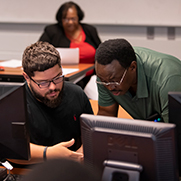Innovation
CITI Blog Article List By Innovation
On Embracing ChatGPT: Strategies for Fostering Critical Thinking and Writing
April 02, 2025
On Embracing ChatGPT: Strategies for Fostering Critical Thinking and WritingEquitable Assessments
January 29, 2025
Our students come to Winston-Salem State University from diverse contexts with varying experiences and backgrounds. As the WSSU vision statement suggests, for our university to be a “premier national leader in advancing equity,” we must reflect on how we promote equity across our campus. Because of this, it is important to consider if our assessments are equitable and inclusive for all.

Digital Storytelling in the Growing AI World
January 17, 2024
The use of Artificial Intelligence (AI) has been prevalent for some time now, but only recently has the discussion around it become more serious. During the fall semester, I aimed to use the AI technology that Adobe released.
Creating a Liquid Syllabus (Can different formats of information engage students?)
October 20, 2023
It tells your students everything from when the class will meet to when the last assignment will be due. It’s the key to how a student should navigate a course, and a place for instructors to give special instructions and expectations for the course.

Unleashing Creativity: Exploring the Use of Generative AI Tools for Teaching and Learning
September 11, 2023
Generative Artificial Intelligence is one of the hottest topics in higher education for many reasons. On August 23, 2023, I had the opportunity to participate on a panel for a Back to School Adobe Cafe' Webinar series again this Fall where our panel will discussed views on the impact generative AI tools will have in teaching and learning.
Doing Digital: Taking Digital Literacy to New Heights at WSSU
February 27, 2023
If the last two years have taught higher education any lesson, it has been that the momentum of digital literacy is accelerating at a high rate. Colleges and universities everywhere faced the issue of addressing ways to close digital gaps in populations of learners on their campuses.
Where are you Digital?
September 23, 2022
Congratulations! The beginning of a new semester is a milestone. By now, you have developed a rhythm for presenting new content and evaluating the effectiveness of course assessments.

Finding the Right Balance in Online and Hybrid Teaching: A Few Tips
September 14, 2021
What a whirlwind of a year we had as WSSU joined almost every university in going 100% online for instruction! Who would have dreamed that all of higher education would go virtual?
Rubric Assessment: Try It; You May Like It!
July 12, 2019
The hot word on many college campuses lately has been “rubric assessment”, and you may be wondering the following:

Using Service Learning in the College Classroom Setting
July 12, 2019
Service learning as defined by Rowls & Swick (2000) is an opportunity for students to explore, study, acquire, and apply skills as well as examine problems and issues in a reflective way. It is a pedagogical approach in which students learn and develop through active participation in thoughtfully organized service experiences that meet actual community needs.

Team Teaching: Lessons from the classroom
July 12, 2019
Being a part of a team-taught course is something akin to handling a beehive. If you do it well, the reward can be professionally nourishing and provide students with an enriched experience. However, if you fail to approach it respectfully and carefully, the end result can sting quite a bit.

Study Away as a High Impact Practice
July 12, 2019
Study abroad for students is a well-known and well-utilized high impact practice (HIPs). It allows numerous opportunities for students, by immersing them in new cultural, linguistic or informational settings, to achieve a transformative learning experience. However, often funding and resources can become impediments to the consistent delivery of these programs or for broad student access.

Engaging a World Through Speculative Fiction
July 12, 2019
In the introduction to Octavia’s Brood, an anthology of speculative fiction short stories inspired by legendary SF writer Octavia Butler, artist and activist Walidah Imarisha writes, “Whenever we try to envision a world without war, without violence, without prisons, without capitalism, we are engaging in speculative fiction.”

Collaborative Assessment: Transforming Assessment into a Learning Opportunity
July 12, 2019
I suspect that many of us think of grading as a one-way transaction in formative assessment. Ideally, grading has the potential to be a source of motivation for students to gauge the degree to which more effort is needed.
